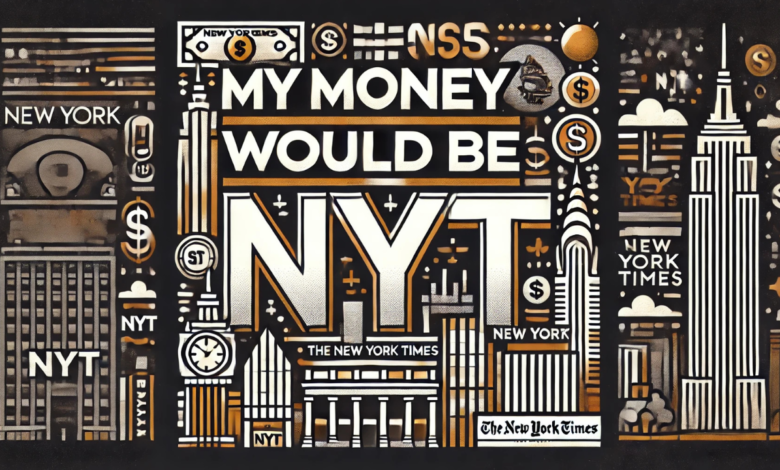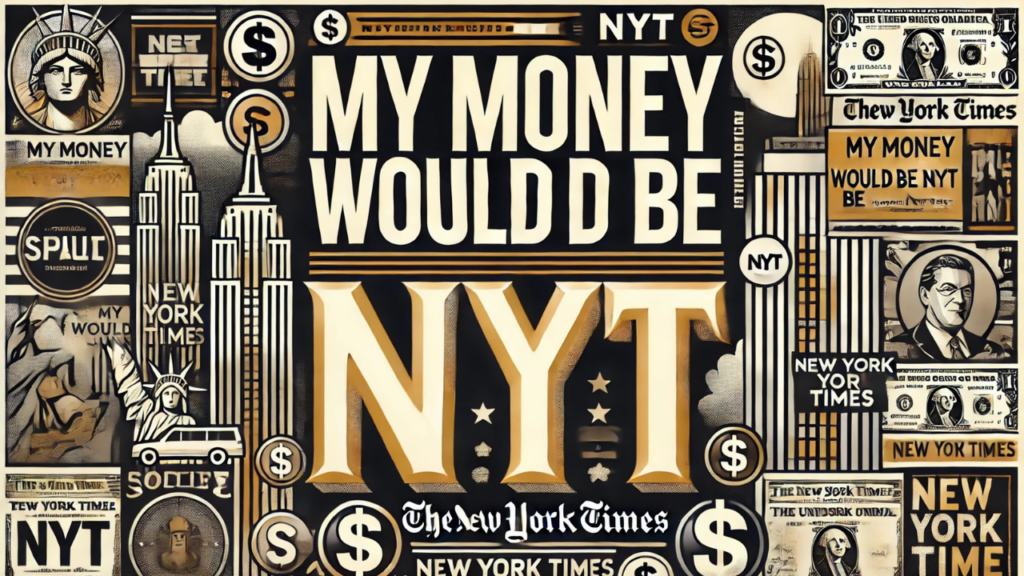Understanding “My Money Would Be NYT”: A Deep Dive into the Concept and Implications

1. Introduction
In the world of finance and personal ambition, phrases like “My Money Would Be NYT” can spark curiosity and reflection. It’s not just a catchy line; it symbolizes a deeper mindset about wealth, success, and what truly matters in the journey to financial independence. my money would be nyt For some, it’s a dream of success and prosperity, while for others, it serves as a metaphor for making decisions that align with long-term goals rather than short-term gains. But what does this phrase really mean? And how does it apply to the modern pursuit of financial freedom?
At its core, “My Money Would Be NYT” draws inspiration from the financial success stories we often see featured in high-profile outlets like The New York Times (NYT). It taps into the idea of wealth not only being a measure of monetary gain but also a symbol of societal influence, innovation, and the ability to shape one’s future. By examining this phrase closely, we can explore the various layers of financial responsibility, investment strategy, and lifestyle choices. Let’s take a closer look at how “My Money Would Be NYT” can influence our approach to money, success, and life.
2. The Meaning Behind “My Money Would Be NYT”

To fully understand the significance of “My Money Would Be NYT,” we need to unpack its meaning. At its most basic level, it speaks to the idea that one’s wealth should be substantial enough to make a mark in high-profile publications like The New York Times, which is often associated with the elite of society, successful entrepreneurs, and top-level investors. However, there’s much more to this phrase than just money.
This phrase embodies the concept of using financial resources to build a meaningful legacy. It’s not about getting rich for the sake of wealth but creating value, whether through business, investments, or charitable endeavors. It’s a reflection of the belief that money should not only serve as a personal asset but also as a tool for influencing the world around you. When people say “My Money Would Be NYT,” they’re often hinting at their desire to use their financial success for greater good — to build something that leaves a lasting impact on society.
In this way, “My Money Would Be NYT” also acts as a personal mantra for those seeking to define their success not just by how much they accumulate, but by what they can contribute. It invites us to think beyond traditional metrics of success, encouraging us to look at the broader picture of wealth and purpose. Wealth, in this context, is not only for self-indulgence but also for the betterment of others.
3. “My Money Would Be NYT” in Personal Finance and Investments
When applying “My Money Would Be NYT” to personal finance and investments, we start to see how this mindset shifts the typical approach to managing wealth. Traditionally, financial success is often tied to accumulating large amounts of money, frequently with a focus on short-term gains. However, those who align with the “My Money Would Be NYT” mentality may lean towards longer-term investments, seeking to grow their wealth in ways that align with their larger goals, such as financial independence, security, and the potential to create a positive legacy.
For example, someone who adopts this mindset may be more inclined to invest in sustainable businesses, innovative startups, or other avenues that have the potential to disrupt industries and create real value. This approach to investing isn’t just about making quick profits but about identifying opportunities that align with one’s values and long-term aspirations. By investing in industries that are changing the world for the better, people who embrace the “My Money Would Be NYT” philosophy aim to not only generate financial returns but also contribute to the global conversation around progress and sustainability.
Additionally, risk management plays a crucial role in this investment philosophy. Rather than taking on reckless or speculative investments, individuals with this mindset focus on opportunities that balance risk with long-term viability. They prioritize understanding market trends, diversifying portfolios, and staying informed about global economic shifts. This careful planning ensures that their wealth continues to grow while remaining aligned with their overarching financial and personal goals.
4. Lifestyle and Success: Does “My Money Would Be NYT” Reflect a New Era of Ambition?
The phrase “My Money Would Be NYT” also speaks to a deeper lifestyle shift in how we view success. In previous generations, success was often defined by owning large homes, flashy cars, or accumulating as much material wealth as possible. However, in today’s world, especially with the influence of social media and the rise of purpose-driven business, success has become more about building meaningful lives that reflect personal values and aspirations. For many, it’s no longer just about how much you have, but how you use what you have to influence the world positively.
For instance, the rise of conscious capitalism, sustainable living, and social entrepreneurship reflects this shift in values. People who embrace the “My Money Would Be NYT” mindset are increasingly interested in using their wealth to make a positive social or environmental impact. This can be seen in the success stories of entrepreneurs and investors who choose to fund green technologies, champion human rights causes, or support education and healthcare initiatives in underserved regions.
The idea behind this lifestyle is that true success is not only about financial gain but also about contributing to a better world. Those who adopt this mindset are motivated not only by monetary rewards but by the desire to make a lasting change. They understand that wealth is a tool — one that can amplify their ability to make a difference.
5. Challenges and Criticisms of “My Money Would Be NYT”
While the “My Money Would Be NYT” mentality may sound inspiring and forward-thinking, it does come with its share of challenges and criticisms. One of the main concerns is that this mindset can sometimes lead to unrealistic expectations. When individuals set their sights on achieving a certain level of wealth and influence, they may overlook the small, everyday steps needed to get there. Financial success rarely happens overnight, and expecting quick results can lead to frustration and poor decision-making.
Another criticism is the risk of becoming too focused on external validation, like being featured in prestigious publications, rather than pursuing genuine passions. The drive to be recognized in high-profile circles, such as The New York Times, can sometimes overshadow personal growth and fulfillment. It’s important to remember that while external recognition can be rewarding, it should not be the sole purpose of financial success.
Furthermore, this mindset may contribute to a culture of comparison, where individuals feel pressure to measure their success against others. In the age of social media, this can lead to feelings of inadequacy or imposter syndrome. To avoid these pitfalls, it’s essential to cultivate a healthy balance between ambition and self-awareness, ensuring that financial goals remain grounded in authenticity and purpose.
6. Conclusion
“My Money Would Be NYT” encapsulates a powerful vision of wealth, success, and purpose. It challenges individuals to view money as more than just a personal asset but as a means to create lasting value in the world. While the phrase has become symbolic of financial success, it’s important to remember that true wealth is measured not just by the amount of money one accumulates but by the impact one makes.
Incorporating this mindset into your financial and lifestyle choices can guide you toward a more purposeful existence. It encourages long-term thinking, responsible investing, and a commitment to making a positive impact. However, it’s important to approach this philosophy with a balanced perspective, avoiding the pitfalls of unrealistic expectations and the pursuit of external validation.
7. FAQs
What does “My Money Would Be NYT” mean in financial terms?
The phrase symbolizes the desire to build wealth that has both personal and societal value, going beyond mere accumulation to create lasting influence and legacy.
How can I apply the concept of “My Money Would Be NYT” to my investment strategy?
Focus on long-term, value-driven investments that align with your values, such as sustainable businesses or innovative companies with potential to change industries.
Are there any risks associated with adopting this mindset for financial success?
Yes, setting unrealistic expectations and focusing too much on external validation can lead to disappointment and poor financial decisions.
How can I balance ambition with realistic financial goals?
By focusing on steady progress, staying informed, and setting achievable milestones, you can keep your ambitions grounded in reality.
Is “My Money Would Be NYT” more of a mindset or an actionable financial strategy?
It’s both a mindset and a strategy, encouraging long-term planning, purposeful investing, and the creation of value-driven wealth.
You May Also Read: https://bigbestwire.com/wakelet/




